Fleurs du Mal Magazine


Or see the index
.jpg)
Cesar Vallejo
(1892 – 1938)
Tiempo, tiempo
Tiempo, tiempo
Mediodía estancado entre relentes.
Bomba aburrida del cuartel achica
tiempo tiempo tiempo tiempo.
Era Era.
Gallos cancionan escarbando en vano.
Boca del claro día que conjuga
era era era era.
Mañana Mañana.
El reposo caliente aun de ser.
Piensa el presente guárdame para
mañana mañana mañana mañana.
Nombre Nombre.
¿Qué se llama cuanto heriza nos?
Se llama Lomismo que padece
nombre nombre nombre nombre.
Cesar Vallejo poetry
fleursdumal.nl magazine
More in: Archive U-V, Vallejo, Cesar

Klimaat
De aarde draait rond
zeker weten
mijn hoofd in het vierkant
dikwijls, soms
het gevaar loert van alle kanten
eenvoudig lijkt het
het leven en de kunst
maar zintuigen sputteren tegen
gedachten weten beter
terug naar de kern
de grondvoorraden slinken
het klimaat warmt op
ozonlaag en natuurplagen
zuurtegraad en woedevlagen
we schreeuwen moord en brand
respect voor de natuur
in al haar vormen
andere denkwijze
gewoontes aanpassen
vijf voor twaalf
kleine inspanningen
grote stap in het behoud
van onze aarde
de kunst van bewust leven
nog niets verloren
Erica De Stercke
fleursdumal.nl magazine
More in: Archive C-D, De Stercke, Erika
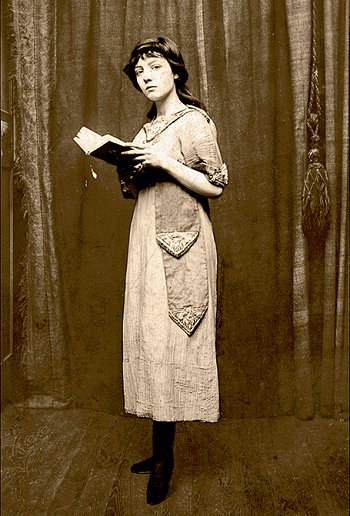
Mireille Havet
(1898-1932)
À un très petit enfant
Pendant la Guerre
Le vent qui souffle ! Tu ne t’en occupes pas.
La guerre qui souffle ! Tu ne t’en occupes pas.
Peu à peu tu apprendras
que sur la terre il y a des orages
et la pluie drue pendant des jours.
Peu à peu tu apprendras
que la haine existe vivace et ardente :
Et le désir de tuer des hommes innocents
parfaitement inconnus de nom et de visage
…. qui auraient pu être des frères
si on avait voulu !
Ô Toi ! Né pendant la guerre
la plus folle ! la plus absolue.
Toi ! spectateur impassible et incompréhensif
qui ne jugeras que bien plus tard,
quand seront éteintes les flammes
et balayées les cendres.
Toi ! qui viens pour reconstruire
avec toute la tendresse de ton regard
bien disposé et sans méfiance,
avec tes mains si douces…. et roses
où peu à peu se dessineront
les grandes lignes de l’existence.
Te voici envoyé vers nous,
avec la perspective de ton enfance
inconsciente et échevelée,
pendant que se finira la guerre démente
et que nous planterons nos croix !
Tu ne viens, ni pour pleurer
ni pour souffrir
en quoi que ce soit, du malheur de notre année !
Tu viens, Promesse d’Avenir,
pour établir et contempler la paix !
Ô mon petit Enfant,
pour l’instant, dans le soleil,
tu joues avec le sable de cette terre
pour laquelle le sang coule
incompressible depuis des mois !
Et tout à l’heure, quand le soleil dormira
sur nos chantiers de morts,
tu souriras à la lumière de ta veilleuse
entre les voiles de ton berceau blanc.
Tu ne sais rien. Ton âme est close.
Tu es la chrysalide du lendemain.
Et je te regarde, affolée par tant d’innocence
et de certitude.
Ta tâche n’est pas la plus douce.
Constructeur parmi les décombres :
Il te faudra aller sans défaillance,
ne pas croire que la vie est mauvaise
parce que la mort fut un instant
la plus forte !
Tout reprendra avec tes soins.
Génération de vie laborieuse et fervente
après notre génération de sacrifices et de croix
— Efflorescence merveilleuse sur nos morts. —
Le soleil se refera d’une clarté éblouissante
et le blé sera haut dans les champs
avec des cigales dedans.
Des maisons blanches seront bâties
au bord des rivières :
au bord de la Meuse, de la Marne, du Rhin !
Et vous saurez être heureux encore
d’un bonheur neuf et vigoureux
comme votre sang d’enfants nés pendant la guerre.
Mais en ce moment : Tu dors,
ignorant la terre, le vent, la lutte ;
tes yeux fermés abritent le secret
de ton âme
qui est bien la plus forte…
avec son rôle à venir
et l’inconscience de son rêve actuel
où se mire l’éternité.
La Maison dans l’œil du chat
Paris, éditions Georges Crès & Cie, 1917
Mireille Havet poetry
fleursdumal.nl magazine
More in: Archive G-H, Havet, Mireille, Mireille Havet
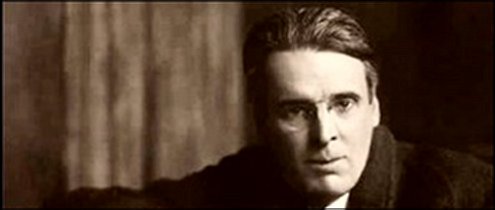
W i l l i a m B u t l e r Y e a t s
(1865-1939)
May God be praised for woman
T h r e e P o e m s
Politics
How can I, that girl standing there,
My attention fix
On Roman or on Russian
Or on Spanish politics?
Yet here’s a travelled man that knows
What he talks about,
And there’s a politician
That has read and thought,
And maybe what they say is true
Of war and war’s alarms,
But O that I were young again
And held her in my arms!
To A Young Girl
My dear, my dear, I know
More than another
What makes your heart beat so;
Not even your own mother
Can know it as I know,
Who broke my heart for her
When the wild thought,
That she denies
And has forgot,
Set all her blood astir
And glittered in her eyes.
On Woman
May God be praised for woman
That gives up all her mind,
A man may find in no man
A friendship of her kind
That covers all he has brought
As with her flesh and bone,
Nor quarrels with a thought
Because it is not her own.
Though pedantry denies,
It’s plain the Bible means
That Solomon grew wise
While talking with his queens.
Yet never could, although
They say he counted grass,
Count all the praises due
When Sheba was his lass,
When she the iron wrought, or
When from the smithy fire
It shuddered in the water:
Harshness of their desire
That made them stretch and yawn,
pleasure that comes with sleep,
Shudder that made them one.
What else He give or keep
God grant me — no, not here,
For I am not so bold
To hope a thing so dear
Now I am growing old,
But when, if the tale’s true,
The Pestle of the moon
That pounds up all anew
Brings me to birth again —
To find what once I had
And know what once I have known,
Until I am driven mad,
Sleep driven from my bed.
By tenderness and care.
pity, an aching head,
Gnashing of teeth, despair;
And all because of some one
perverse creature of chance,
And live like Solomon
That Sheba led a dance.
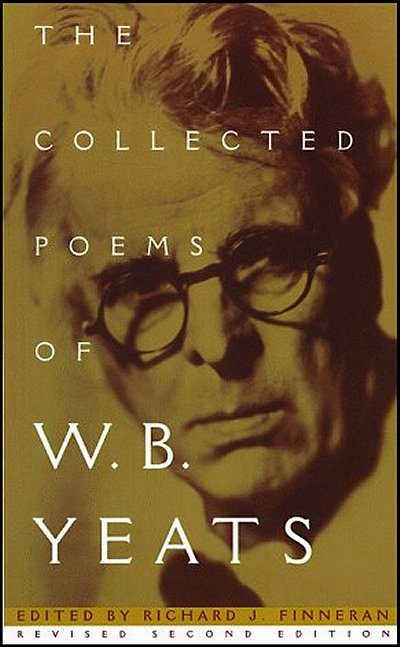
FLEURSDUMAL.NL MAGAZINE
MAGAZINE FOR ART & LITERATURE
More in: Archive Y-Z, Yeats, William Butler
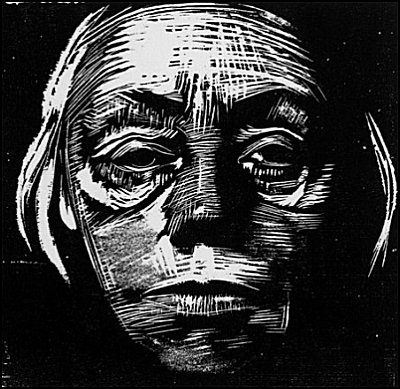
K ä t h e K o l l w i t z
D i e T o t e n m a h n e n u n s
( I I ) B i l d e r
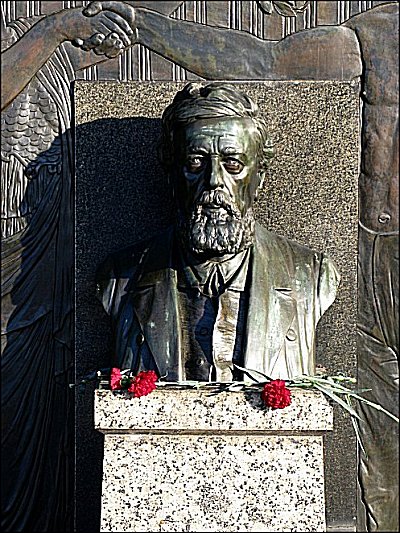
Denkmal Karl Liebknecht
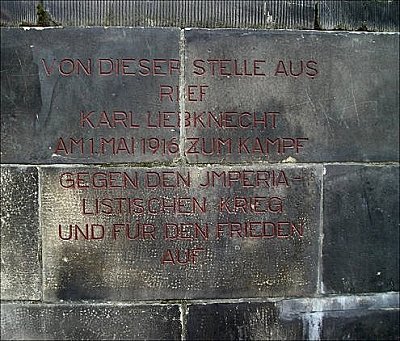
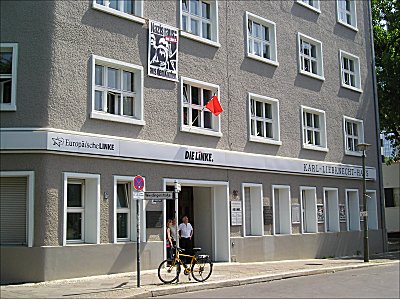
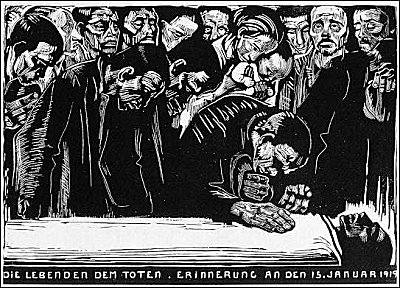
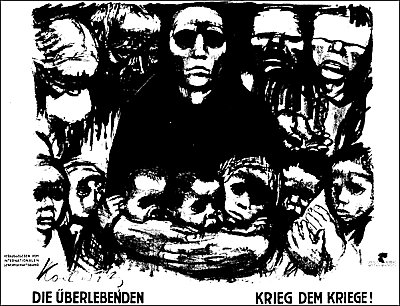
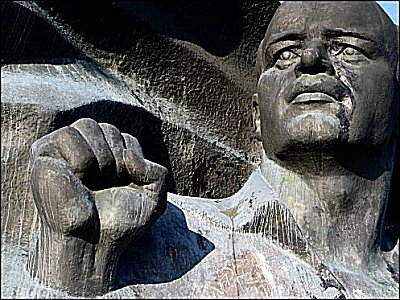
Denkmal Ernst Thalmann
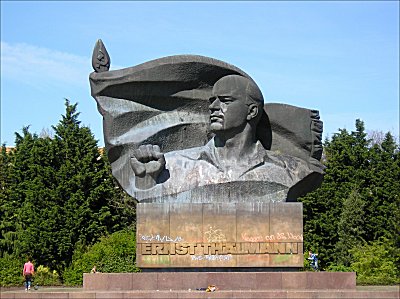
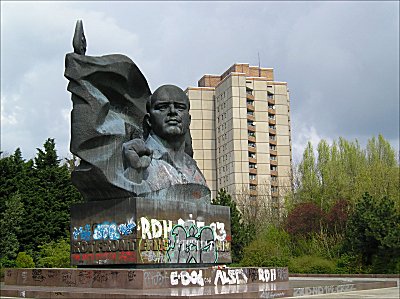

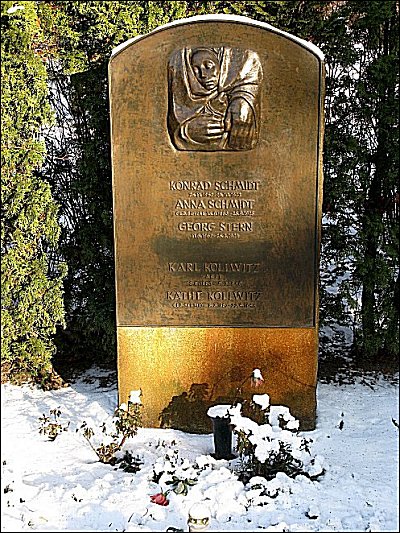
.jpg)
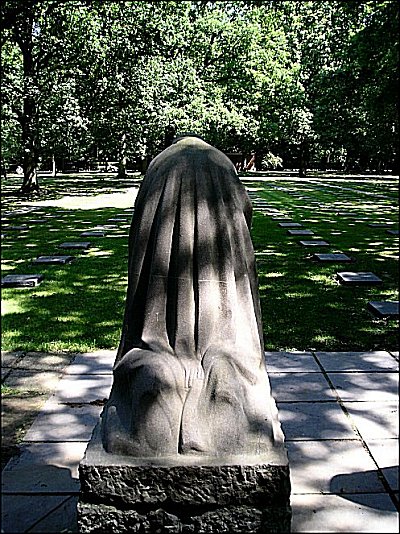

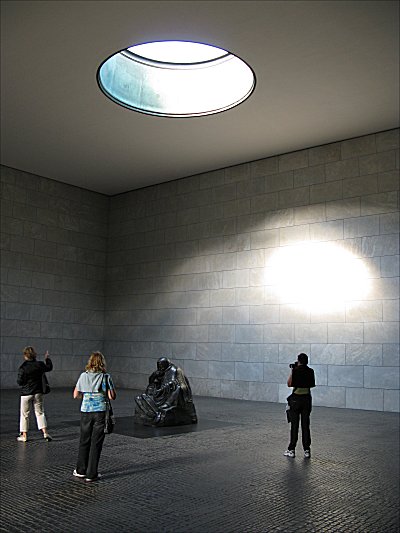
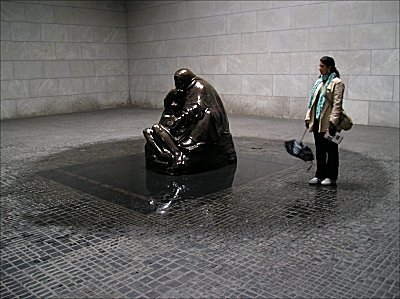

Käthe Kollwitz
Die Toten mahnen uns (II) Bilder
Photos: Anton K. Berlin
fleursdumal.nl magazine – magazine for art & literature
More in: *War Poetry Archive, Anton K. Photos & Observations, Käthe Kollwitz
.jpg)
K ä t h e K o l l w i t z
Die Toten Mahnen uns
Berlin
The street names still reflect old DDR times, before the demolishment of the wall in 1989. The Karl-Liebknecht-Straße runs alongside the Alexanderplatz and connects Prenzlauer Berg to the Museuminsel and Unter den Linden. At the Rosa-Luxembourg-Platz, a few hundred meters to the north, a monument to Herbert Baum and a memorial plaque to Ernst Thälmann commemorate the resistance of the communists against fascism and against the wars that overshadowed life in Europe during the first half of the 20th century. The rise of a working class who lived in miserable conditions dominated social discussions in the early 1900’s. In 1914 a complex combination of imperialism, militarism and strong nationalistic feelings led to the First World War which eventually involved 75 percent of the world’s population and took the lives of 20 million soldiers and civilians. After the war the political situation in Germany remained unstable. The Treaty of Versailles declared Germany responsible for the war, it redefined its territory and Germany was forced to pay enormous war reparations. This treaty caused great bitterness in Germany and was a source of inspiration for both left and right extremism. It eventually led to the rise of fascism and the Second World War. Karl Liebknecht and Rosa Luxembourg, founders of the Kommunistische Partei Deutschland (KPD), were killed in 1919 by Freikorpsen, right extremist remainders of the German army. Herbert Baum and his resistance group were killed by the Gestapo in 1942 and Ernst Thälmann, Hitlers political opponent during the elections of 1932, was executed in Buchenwald in August 1944, on direct orders from Hitler.
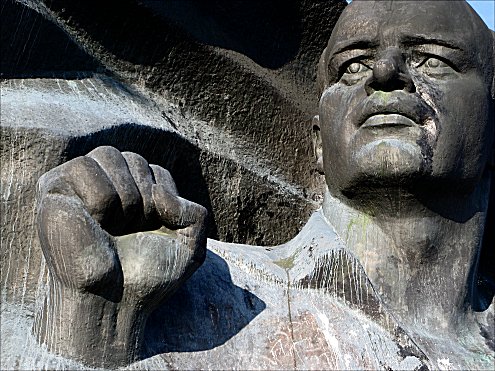
Käthe Kollwitz
Käthe Schmidt was born in Königsberg in 1867 in a family of social democrats that were sensitive to the changes that were taking place in society. Her talent for art was recognised and stimulated by her father. She received lessons in drawing in a private art school in Berlin. Under the influence of her teacher Stauffer-Bern and the work of Max Klinger she decided to focus on black and white drawing, etching and lithography. She married Karl Kollwitz, a friend of the family, in 1891. Karl had decided to dedicate his live to the poor working class and started a doctor’s practice in Prenzlauer Berg in a street that is now called the Käthe-Kollwitz-Straße. They had 2 sons, Hans and Peter. Käthe was deeply moved by the social misery she was confronted with in her husbands practice and the life of the working class became a dominant theme in her work. It was Gerhard Hauptman’s play ‘die Weber’ that inspired her to her first successful series of etchings called ‘Ein Weberaufstand’. Another successful series was ‘Bauernkrieg” for which she received the prestigious ‘Villa Romana’ price. At the age of 50 Käthe had become famous throughout Germany and to the occasion of her birthday, exhibitions of her work were held in Berlin, Bremen and Königsberg.
In October 1914 her son Peter was killed in the trenches of Flanders. To his memory Käthe designed a monument which took her almost 18 years to complete. In Diksmuide-Vladslo, in a landscape covered by hundreds of war cemeteries, her ‘Grieving Parents’ impressively expresses the poignant grief and helplessness of parents who have lost a child. The death of her son had a great impact on her work and war and death became the dominant themes. When Karl Liebknecht was killed in 1919 his family asked Käthe to make a drawing to his memory. In a charcoal drawing she depicts the worker’s farewell to Liebknecht. A final version in woodcut was made 2 years later. Sieben Holzschitte zur Krieg were made in 1920/1923 and her famous poster Nie Wieder Krieg, a consignment by the International Labours Union, in 1924. She was not the only artist that stood up against war but while the artistic protests of for instance George Grosz, Otto Dix or Frans Masereel were primarily aimed at the horrors of the battlefield or the political climate, Käthe Kollwitz’s concern was with the human suffering of those who were left behind.
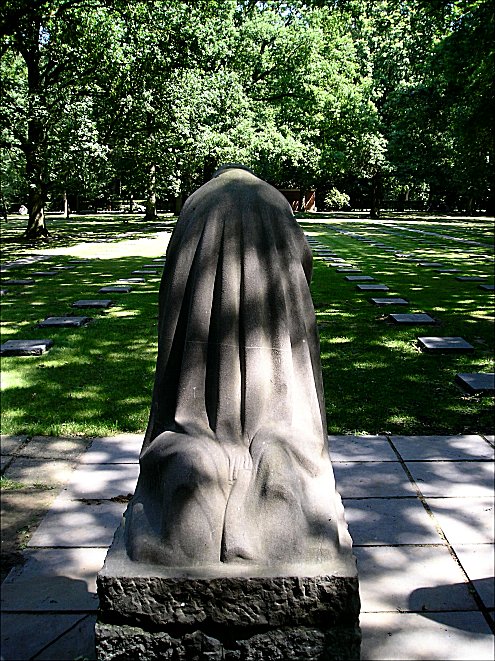
When the Nazis came to power in 1933, she and her husband signed an urgent appeal to unite the working class and to the formation of a front against Hitler. The SPD and KPD were forbidden by the Nazis and Käthe was removed from her position at the Berlin Art Academy where she was heading the Masterclass of Graphics. Exhibitions of her work were forbidden. Karl was also temporarily disallowed to exercise his practice and their financial situation became precarious until his ban was relieved due to a shortage of skilled physicians. Karl Kollwitz, after a life dedicated to the health of the poor, died in July 1940.
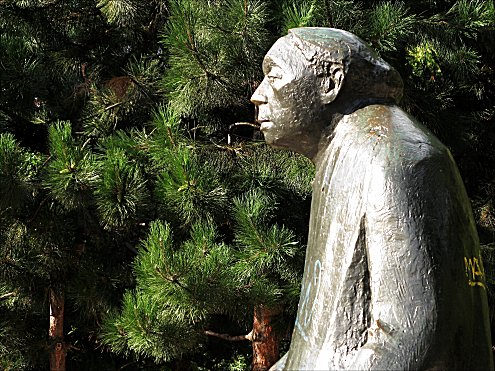
After Karl’s death Käthe suffered from depression and her physical condition was rapidly declining. The house in Berlin where she and Karl had been living since 1891 was bombed in 1943 and Käthe was evacuated to Nordhausen and later to Moritzburg. A few days before the end of the Second World War, in April 1945, Käthe Kollwitz died. She was buried in the family grave in Berlin-Friedrichsfelde at the same cemetery where a memorial monument pays tribute to the socialist heroes Karl Liebknecht, Rosa Luxembourg and Ernst Thälmann.
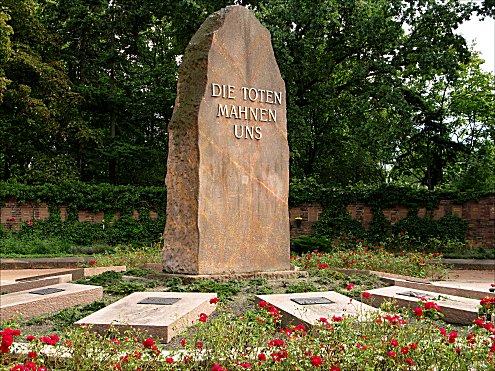
A mission
Käthe’s importance as an artist cannot be overvalued. Her authentic, expressive depictions of human misery, resulting from the exploitation of human labour, from fascism and war, are timeless, genuine and moving. She was not a politician but an artist with a vocation who found a way to make art that goes straight to the heart.
When you are in Berlin be sure to visit ‘Die Neue Wache’, a building designed by Christian Schinkel, which since the 1960-s is a monument against war and fascism. In the centre of the building, right beneath a circular opening in the ceiling, Käthe Kollwitz’s sculpture Mother and Child is an arresting plea for vigilance against mentalities and attitudes that may again lead to fascism and war.
References:
Ilse Kleberger: Kathe Kollwitz, Eine Biographie
Venues
Neue Wache – Unter den Linden near the Museuminsel
Kathe Kollwitzmuseum Berlin – Fasanenstrasse 24
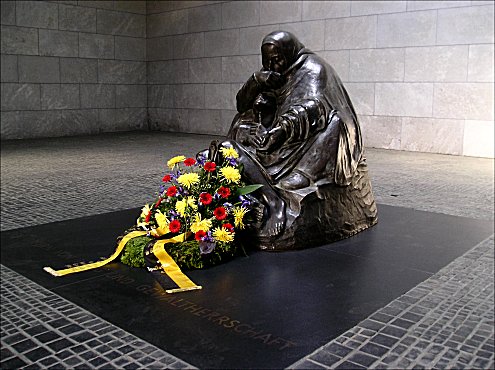
Käthe Kollwitz: Die Toten mahnen uns – part I
Photos & text: Anton K. Berlin
![]()
Find also on fleursdumal.nl magazine:
Nie Wieder: Wache gegen Faschismus
and
Historia Belgica: Alles voor Vlaanderen
![]()
fleursdumal.nl magazine – magazine for art & literature
to be continued
More in: *War Poetry Archive, Anton K. Photos & Observations, Fascism, Käthe Kollwitz, Sculpture
.jpg)
Street poetry:
Niets in de ruime wereld is zo blij als deze aarde….
Herman Gorter
Photo jef van kempen, Brugge
fleursdumal.nl magazine
More in: Gorter, Herman, Jef van Kempen, Jef van Kempen Photos & Drawings, Street Art
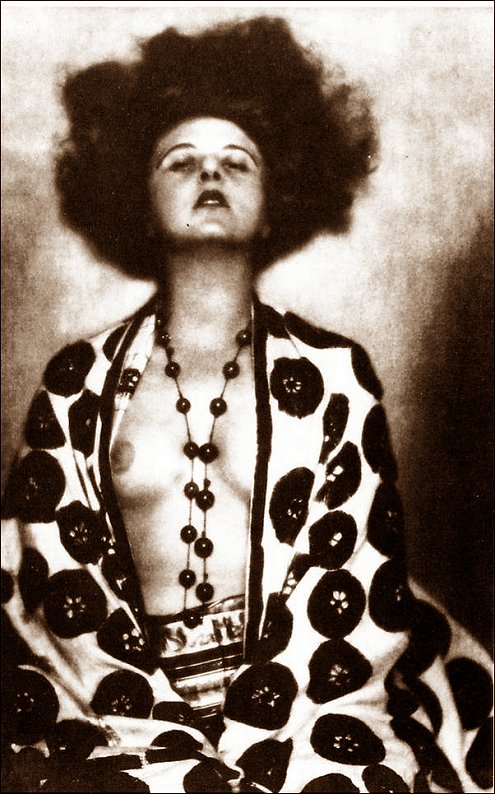
ANITA BERBER
(1899-1928)
O r c h i d e e n
Ich kam in einen Garten
Der Garten war voll von Orchideen
So voll so voll und schwer
Es blühte und lebte und bebte
Ich kam nicht durch die süßen Verschlingungen
Ich liebe sie so wahnsinnig
Für mich sind sie wie Frauen und Knaben –
Ich küsste und koste jede bis zum Schluss
Alle alle starben an meinen roten Lippen
an meinen Händen
an meiner Geschlechtslosigkeit
Die doch alle Geschlechter in sich hat
Ich bin blass wie Mondsilber
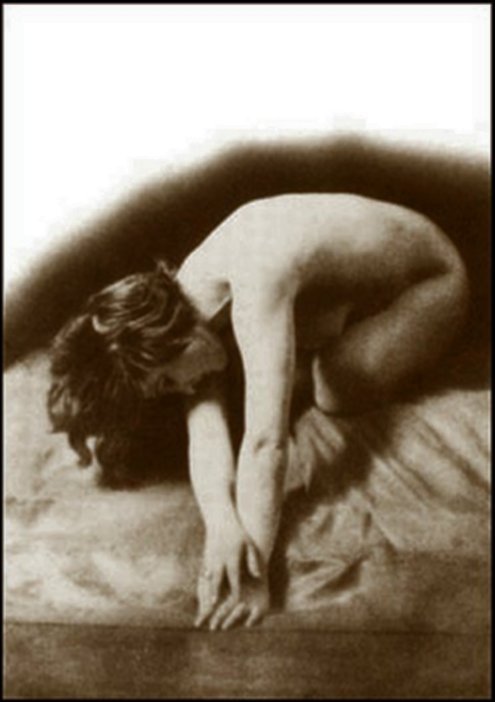
Anita Berber Gedichte
fleursdumal.nl magazine
More in: Anita Berber, Anita Berber, Berber, Anita, DANCE & PERFORMANCE
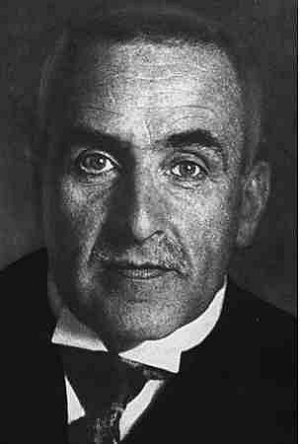
Frank Wedekind
(1864-1918)
Der Gefangene
Oftmals hab ich nachts im Bette
Schon gegrübelt hin und her,
Was es denn geschadet hätte,
Wenn mein Ich ein andrer wär.
Höhnisch raunten meine Zweifel
Mir die tolle Antwort zu:
Nichts geschadet, dummer Teufel,
Denn der andre wärest du!
Hilflos wälzt ich mich im Bette
Und entrang mir dies Gedicht,
Rasselnd mit der Sklavenkette,
Die kein Denker je zerbricht.
Frank Wedekind poetry
fleursdumal.nl magazine
More in: Archive W-X, Frank Wedekind

Anne Boleyn
(1507?-1536)
Defiled is my name full sore
Through cruel spite and false report,
That I may say for evermore,
Farewell, my joy! Adieu comfort!
For wrongfully ye judge of me
Unto my fame a mortal wound,
Say what ye list, it will not be,
Ye seek for that can not be found.
Anne Boleyn poetry
fleursdumal.nl magazine
More in: Anne Boleyn, Archive A-B
.jpg)
Marcel Proust
(1871-1922)
Mozart
Italian at arms or Prince of Bavaria
His sad and icy eye enchanted by languor!
In his chilly gardens he encounters his heart
His bosom swells to shadow, where he nurses the light.
His tender German heart, – so deep a sigh!
Finally he tastes love’s idle being,
His hands too weak to hold his book
Beaming with hope in his charmed head.
Cherub, Don Juan! Standing in pressed flowers
Far from the lapse of memory
Such an amount of perfumes fan
Drying the tears the wind disperses
From Andalusian gardens to the tombs of Tuscany!
In the German park where troubles mist,
The Italian is still king of the night.
His breath makes the air soft and spiritual
And love drips from his enchanted flute
In the hot still shade of good-byes on a fine day
Of fresh sorbets, kisses and sky.
![]()
Marcel Proust poetry
fleursdumal.nl magazine
More in: Marcel Proust, Proust, Marcel
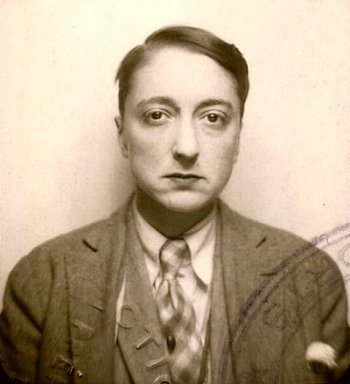
Mireille Havet
(1898-1932)
Arlequin
Mon petit Arlequin
si triste sur le divan
dans la journée molle et que creuse l’orage
aux labours du printemps
tu as chu comme une feuille balancée
pétale détachée qui s’envole
En culotte de soie de toutes couleurs
tes jambes fines en lignes coupées
par les ramages
voyant paysage d’une féerie
de mauvais aloi
où les pommes ont des yeux
et les oiseaux trois pattes
Tu étales dans l’argenterie d’un crépuscule
tout balancé de pluie et d’arrosage
ta souplesse infernale
de sauts périlleux et de scandales
Arlequin mon petit camarade
aux gestes de pantin
qui donc aujourd’hui a tenu
la ficelle de ta belle âme
qui donc a tiré l’élastique de tes quatre membres
que je te vois si pâle et si défait
dans ce costume
qui appelle la bâtonnade
d’un pierrot ridicule
Les jardins ont versé leurs odeurs
sur la route
toute une procession de marronniers
en fleurs
de lilas doubles et de tulipes
quelqu’hirondelle basse écorcha ses ailes
au rosier
et l’orage s’est ouvert
ronronnant troupeau d’abeilles
au ciel électrique de lumière
Alors
abrités par ta maison claire
et mariés d’avance sous le joug diluvien
de l’averse
nous avons cherché
toi familier des planches
et des ramages et des fards
et moi voyageur prodigue au mouchoir
à carreaux faisant mon tour de France
la double douceur de nos chairs nerveuses
illuminées par la saison nouvelle
ses aubes claires et ses rossignols
j’entendais ruisseler les gouttières
et s’abreuver la terre molle
où germent les graines potagères
j’entendais rabattus par le vent
les volets claquer au balcon
et ces intermittences de tonnerre
Longtemps je garderai aux doigts
le souvenir de ta culotte soyeuse
je te cherchais à travers
l’arc-en-ciel
et l’odeur des géraniums
mon petit frère perdu dans les mascarades
et les confettis
mon petit dévoyé de l’école
que faisons-nous
Et pourquoi pas plutôt l’atlas ouvert
sur nos genoux
ou bien les rois de France
Apprendre enfin pour devenir des hommes
Ah ! tu es pris sous moi pris
nous nous entrouvrons sur le néant
du monde
Voilà que chancelle le masque de tes yeux
ta bouche trop rouge
où j’ai mordu l’admirable forme
sa lampe à la main
Arlequin est à la fenêtre
son profil ausculte la nuit
la douteuse lumière pose
des ronds ensoleillés
Sur ses hanches satinées
de danseur immobile
et je me tourne inquiet
pour mieux voir
Car dans mon rêve
j’avais ôté son masque
son petit masque de velours
Si bien ajusté
Cependant
à ses joues chaudes
et son visage entier
m’était apparu
Arlequin
regarde-moi
du mensonge
dans un arc si pur
Vais-je découvrir enfin le haut de ton visage
car tes pupilles claires
dans l’échancrure noire
Arlequin
vais-je savoir
quel dieu
tu es
Mais
dans la nuit venue
où se dresse sur un nuage tourmenté
la petite serpe de la lune enchantée
qui servit à trancher
tant de pavots magiques
Dans la nuit où se recomposent
les jardins échevelés par la pluie
et leurs odeurs mêlées
jeu de patience que brouilla l’orage
je m’éveille
Aladin
Surpris par un rêve incroyable
Est-il vrai que c’était mon visage
une telle ressemblance est-elle possible
mon visage sous ton masque
que j’embrassai toute une nuit
Bientôt, dit-il, je te quitterai pour toujours
le jeu a duré bien longtemps pour mon arlequinade
je ne sais vraiment ce qu’il m’a pris
entend les coqs qui ouvrent les routes
de l’aurore
II faut que j’aille réjouir les villes
leur petit guignol de planches et d’or
avant que le matin ne ternisse de rosée
mon brillant costume
Il faut que j’aille danser
rejoindre Colombine
et tous les autres
que serait la comédie sans Arlequin
Vraiment que serait la comédie
tu n’y songes pas
Il parlait à demi tourné vers la fenêtre
et l’ombre me cachait sa figure
c’est alors que m’étant levé
pour le rejoindre
d’une jambe souple
il sauta
dans le vide
Arlequin
le masque détaché par la chute
vient s’abattre oiseau triste
dans mes mains
et je ne vis plus
sur les routes de l’aurore
S’en allant à reculons
avec des gestes de parade foraine
qu’un petit pantin mécanique et bouffon
dont le visage levé
IDENTIQUE AU MIEN
…..souriait obstinément vers le jour
Revue Les Écrits Nouveaux Tome IX – nr 6 (juin 1922)
Mireille Havet poetry
fleursdumal.nl magazine
More in: Archive G-H, Havet, Mireille, Mireille Havet
Thank you for reading Fleurs du Mal - magazine for art & literature